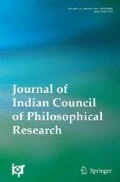Abstract
Environmental philosophy is well discussed in contemporary times. Yet, skeptics raise an important question: What is philosophical in environmental philosophy? The question is pertinent enough when one does not find anything philosophically substantive in environmental philosophy, namely substantive metaphysical, epistemological, axiological, and ethical inquiries in this field. At best a few fashionable philosophers talk about intrinsic value in nature. This is a serious threat to environmental philosophy that there is hardly any philosophy in it. In this paper, I argue that the “real business of philosophy” should go for an urgent makeover because metaphysics apart, philosophically relevant inquiries into environmental matters include epistemological, axiological, and ethical inquiries. Interestingly, these important inquiries are not watertight in so far as environmental matters are in question. In the first part of the paper, I take a renewed look at environmental epistemology and then proceed to consider environmental metaphysics. Furthermore, I argue for a comprehensive epistemological–metaphysical–axiological–ethical inquiry that makes environmental philosophy, a vibrant philosophical enterprise.
Similar content being viewed by others
Notes
For organismic views of Arne Naess, Bill Devall, George Sessions and Warwick Fox, essays Edited by Andrew Light and Holmes Rolston III, in Environmental Ethics: An Anthology, Blackwell, 2007 are of great use.
J. Baird Callicott’s argument can be seen in “The Metaphysical Implication of Ecology”, Environmental Ethics, Vol. 8, 1986, pp. 301–316.
Kirkman, Robert, Skeptical Environmentalism: The Limits of Philosophy and Science, Indiana Club Press, Bloomington, 2002, p. 151.
Postmodern environmental philosophy has been portrayed in many ways, Jim Cheney’s “Postmodern Environmental Ethics: Ethics as Bioregional Narrative” in Environmental Ethics, Vol. 11, 1989, pp. 117–134 is remarkable in this regard.
Preston, C.J., “Epistemology and Environmental Philosophy: The Epistemic Significance of Place”, Ethics and the Environment, Vol. 10, No. 2, 2005, pp. 1–4.
Ibid.
Ibid.
Rowlands, Mark, “Environmental Epistemology”, Ethics and the Environment, Vol. 10, No. 2, 2005, pp. 5–27.
Ibid., p. 25.
Ibid.
Ibid.
Ibid.
Cheney, Jim, “Truth, Knowledge and the Wild World”, Ethics and the Environment. Vol. 10, No. 2, 2005, p. 105.
Ibid., p. 109.
Ibid., p. 116.
Ibid., p. 121.
Deloria, Jr. Vine, “If you think About It, You will see that It Is True”, Spirit & Reason, The Vine Deloria Jr. Reader (Eds.) Barbara Deloria, Kristen Foehner and Sam Scinta, Fulcrum Publishing, Colorado, 1999.
Cheney, Jim, Op. Cit., p. 122.
Ibid, p. 126.
Norton, Bryan, “Past, Present and Future of Environmental Ethics/Philosophy”, Ethics and the Environment Vol. 12, No. 2, 2007, pp. 134–136.
Ibid., p. 136.
Devion, Victoria, “Future of Environmental Philosophy”, Ethics and the Environment, Vol. 12, No. 2, 2007, p. 149.
Rolston III, Holmes, “F/Actual Knowing: Putting Facts and Values in Place”, Ethics and the Environment, Vol. 10, No. 2, 2005, pp. 137–174.
Ibid., p. 140.
Ibid.
Ibid., p. 142.
Ibid., p. 142.
Cheney, Jim, Op. Cit., p. 107.
Ibid., p. 106.
Ibid., p. 107.
Rolston III, Holmes, Op. Cit., p. 145.
Ibid., p. 167.
Holmes Rolston III has been vociferous in his support to value of nature that is intrinsic to it. One of the important essays on this topic by Rolston is: “Value in Nature and the Nature of Value”, Environmental Ethics: An Anthology, Blackwell, 2007, pp. 143–153.
Weston, Antony, “Beyond Intrinsic Value: Pragmatism in Environmental Ethics”, Environmental Ethics: An Anthology, Blackwell, 2007, p. 313.
Ibid., p. 317.
Norton, Bryan G., “Applied Philosophy versus Practical Philosophy: Toward an Environmental Policy Integrated According to scale”, in Environmental Philosophy and Environmental Activism, (Eds.), Don E. Marrietta Jr., Lester E. Embree, et.al., Lanham, 1995, p. 126.
Kirkman, Robert, Op. Cit., p. 169.
For a detailed account refer to my paper “A Defense of Hermeneutic and Feminist Turn in Ethics”, JICPR, Vol. XXVI, No. 4, 2009, pp. 31–56.
The classical models of value resolution and thorough critique of these models may be seen in my work Primer of Applied Ethics Vol. 1 of “Practical and Professional Ethics”, Concept Publishing House, New Delhi, 2007.
Minteer, Ben A. and Manning, Robert E., “Pragmatism in Environmental Ethics: Democracy, Pluralism and the Management of Nature”, Environmental Ethics: An Anthology, Blackwell, 2007, p. 321.
Ibid., p. 325.
Author information
Authors and Affiliations
Corresponding author
Rights and permissions
About this article
Cite this article
Guha, D. What is Philosophical in Environmental Philosophy?. J. Indian Counc. Philos. Res. 35, 447–461 (2018). https://doi.org/10.1007/s40961-018-0147-9
Received:
Revised:
Accepted:
Published:
Issue Date:
DOI: https://doi.org/10.1007/s40961-018-0147-9




